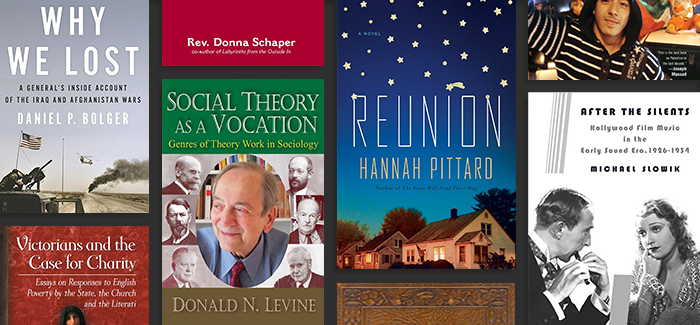
The Magazine lists a selection of general interest books, films, and albums by alumni. For additional alumni releases, browse the Magazine’s Goodreads bookshelf.
After the Silents: Hollywood Film Music in the Early Sound Era, 1926-1934
Michael Slowik, AM’05 Author
San Diego State University assistant professor Michael Slowik viewed more than 200 films for his study of the emergence of music in Hollywood and its impact on the subsequent golden age of film music from 1935 to 1950. He recounts early attempts to match music to operas, melodramas, musicals, radio shows, and silent films, and how these experiments shaped the development of sound in film.
Reunion
Hannah Pittard, AB’01 Author
Kate Pulaski, the dysfunctional protagonist in Hannah Pittard’s second novel, learned of her estranged father’s suicide while waiting on an airport tarmac before a flight to her Chicago home. Kate, already struggling with a failed screenwriting career and crumbling marriage, is soon on another flight to Atlanta to join an assortment of siblings, step-siblings, and her father’s ex-wives in laying him to rest. As she faces her family’s past and confronts her own realities, Kate questions how well she really knew her father, and how well she knows herself.
Social Theory as a Vocation: Genres of Theory Work in Sociology
Donald N. Levine, AB’50, AM’54, PhD’57 Author
Does anyone still make a living as a social theorist? It’s hard to believe anyone could in post–financial crisis America, with lagging institutional support for the humanities and social sciences. Social Theory as a Vocation gives the field a facelift, tackling questions from throughout the universe of social theory, and concluding with an examination of what Donald Levine, the Peter B. Ritzma Professor Emeritus of Sociology at the University of Chicago, views as the contemporary crisis of liberal education.
A Chosen Exile: A History of Racial Passing in American Life
Allyson Hobbs, AM’02, PhD’09 Author
Black Americans who passed as white between the 18th and mid-20th centuries gained benefits, from escape from slavery to better social mobility and work opportunities. But for Stanford historian Allyson Hobbs, the story of racial passing is “a coherent and enduring narrative of loss,”—a loss of roots, of community, and of self. Through stories of men and women who chose this lonely exile, Hobbs offers a new take on perennial questions of race and identity.
Victorians and the Case for Charity: Essays on Responses to English Poverty by the State, the Church, and the Literati
Marilyn D. Button, AM’92, and Jessica A. Sheetz-Ngyuen Editors
In 19th-century England, the plight of the poor was pervasive and difficult to ignore. Centered around the passage of the 1834 New Poor Laws, the essays in Victorians and the Case for Charity explore how educators, theologians, economists, writers, nuns, business leaders, and politicians responded to poverty in Britain. Each essay examines a different attempt to help the poor and reveals the engagement of different strata of Victorian society with one of the defining social issues of their day.
Why We Lost: A General’s Inside Account of the Iraq and Afghanistan Wars
Daniel Bolger, AM’86, PhD’86 Author
“I am a United States Army general, and I lost the Global War on Terrorism.” In Daniel Bolger’s frank, detailed exploration of what went wrong during the wars in Iraq and Afghanistan, the three-star general places the blame on military leaders like himself. The ability and bravery of American soldiers was greatly misused, he argues, by sending forces designed for short, decisive conflicts into draining counterinsurgency efforts against a poorly defined enemy, and then not changing course as the wars flagged and casualties mounted. “This was our war to lose,” he says of himself and his fellow generals, “and we did.”
Sacred Speech: A Practical Guide for Keeping Spirit in Your Speech
Donna Schaper, AM’71 Author
Only one thing separates sacred speech from ordinary speech: Spirit. That’s Donna Schaper’s word for God—not any particular diety, but “the God beyond Christianity, Judaism, Islam, Buddhism, or Star Trek.” Although her book is described as a how-to guide for using the “holy gift” of speech, Sacred Speech focuses more on the intentions behind words than the words themselves. The result is a framework for communicating with love, praise, and forgiveness instead of fear, judgment, or blame.
